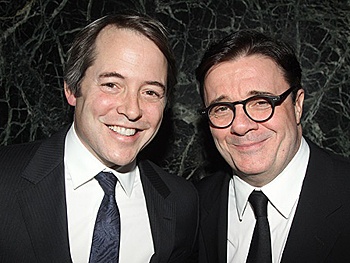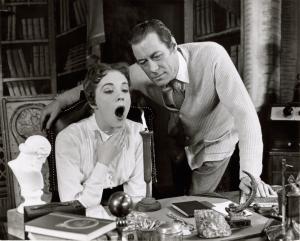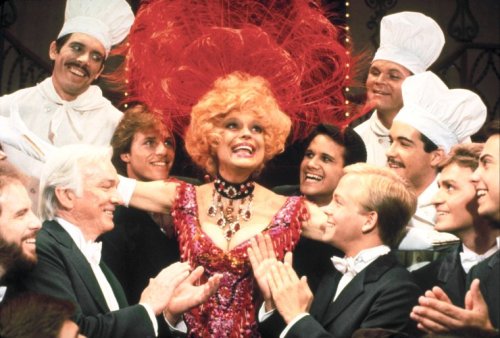 |
| A scene from the London production of The Curious Incident of the Dog in Night-time, one of several new works making the journey across the pond for the Fall season. |
This past Monday saw the first preview performance of This Is Our Youth, meaning the Fall 2014 Broadway season is officially upon us. I've already taken a look at the many star-driven revivals coming to the Great White Way in the next few months; thankfully, unlike last fall's dismal showing of new plays (critical and commercial flops The Snow Geese and A Time to Kill), this fall has a few promising new works to balance out all those revivals. Hell, at least one of these plays is virtually guaranteed to be a sell-out hit, and given strong productions a couple of the others could also be at least critical if not necessarily commercial hits. So what's on deck for the fall? Find out below.
The Country House
Previews begin 9/9; Opening Night 10/2
One thing Manhattan Theatre Club can always be counted on for is attracting name talent to new works. I personally feel MTC's new plays trend a little too upper class and cerebral for their own good, but every once and a while the famed not-for-profit produces a daringly original and energetic piece like Venus in Fur. Unfortunately, The Country House sounds like par for the course at MTC (re: well-done but a little boring). Blythe Danner stars in this Donald Margulies play about a group of established and aspiring artists in a summer home in the Berkshires, with the explicit promise of "romantic outbursts" and "passionate soul-searching" along with an implicit promise of weighty discussions about art and culture. I actually enjoyed MTC's production of Margulies' Time Stands Still several seasons back, but this new work just sounds ponderous. I'm predicting respectable reviews and a respectable run, although it would take something unexpected for this play to take off and become a true hit.
The Curious Incident of the Dog in Night-time
Previews begin 9/10; Opening Night 10/5
The Curious Incident of the Dog in Night-time is the latest in a long, mostly distinguished line of new works originating in the West End. A hit oversees, the play centers on an incredibly intelligent but socially awkward teenage boy who is accused of killing his neighbor's dog, and his attempts to uncover the real killer. Coming to Broadway from London's prestigious National Theatre, this Olivier-winning play sounds a good deal more interesting and inventive than a lot of our home grown theatre, probably because England's government subsidized arts scene is a little more embracing of theatricality and invention (see War Horse). That said, some of these West End transfers lose something in the journey across the Atlantic, failing to live up to the hype generated by their reputations (see War Horse again). The reviews will probably dictate how well this does. If the critics embrace it, I expect it to settle in for a healthy run and potential Tony Awards; if they are lukewarm, it will probably close with relatively little fanfare. I am certainly curious, and just glad to see a high-minded drama that isn't solely concerned with the problems of upper class white people.
Disgraced
Previews begin 9/27; Opening Night 10/23
Like far too many plays, Disgraced concerns a group of upper class New Yorkers. But in this case, two of them are Muslim-American, and the play comes to Broadway having already won the 2013 Pulitzer Prize for Drama. Which is certainly enough to make anyone sit up and take notice, and of all the new plays scheduled for fall this is the one I am most interested in seeing. A contemporary take on a contemporary subject (the place of practicing Muslims in post 9/11 America), Disgraced sounds fresh and provocative, unlike the staid dramas that have taken over Broadway in the past few years. Barring some kind of creative implosion in the production, I expect this to be one of the more buzzed about works of the fall, and a clear early contender for Tony consideration come spring.
The River
Previews begin 10/31; Opening Night 11/16
The producers of Jez Butterworth's The River have scored the biggest casting coup of the fall: they somehow convinced box office magnet Hugh Jackman to star in this new play by a decidedly off-beat English playwright. Add in the fact that the Circle in the Square is one of Broadway's smallest houses and you have what is sure to be one of the hottest tickets in town. While The River's box office success is virtually assured - audiences have repeatedly proven they will turn up to see Jackman in just about anything - artistically the play is another story. I personally was underwhelmed by Butterworth's 2011 Tony-nominee Jerusalem (without the incomparable Mark Rylance that would have been a wasted 3 hours in the theatre), but many critics enjoyed the show and may again be charmed by Butterworth's work. I personally have no interest to see this play, which I suspect will be remembered much more as a financial success than an artistic one.
Constellations
Previews begin 12/16; Opening Night 1/13
Not much is known about this Manhattan Theatre Club production, other than the fact it will mark Oscar-nominee Jake Gyllenhaal's long-awaited Broadway debut. Something about the play must have enticed the notoriously choosey Gyllenhaal to Broadway, and it certainly wasn't MTC's not-for-profit pay scale. The official plot description of this West End transfer sounds heady - it is described as a "mind-bending" work that "defies the boundaries of the world we think we know" on MTC's website - which means it could either be an adventurous, inventive new work or a pretentious quagmire too caught up in its own premise to actually work. And while Gyllenhaal isn't a particular draw for me, he likely will be to a lot of other people, so hopefully this play turns out well.
And there you have the five new plays scheduled to open on Broadway in the next few months. Check back soon for the final instalment of my Fall Preview series, which will focus on the musicals coming to Broadway between now and Christmas. In the meantime, don't forget to catch up with part 1 of the series:
2014 Fall Preview: Play Revivals



